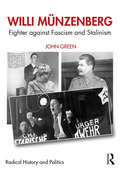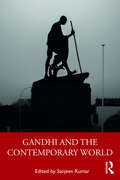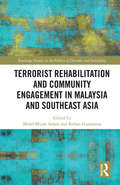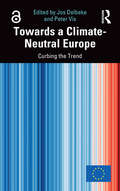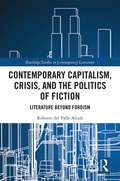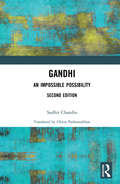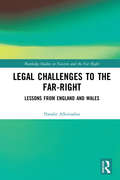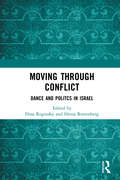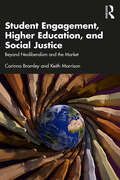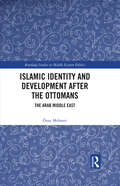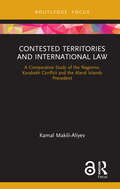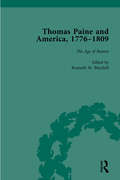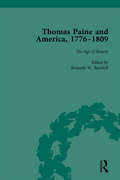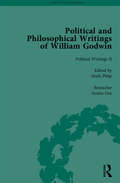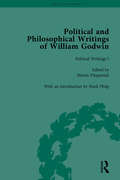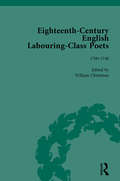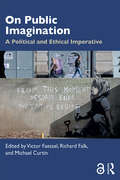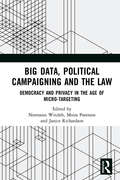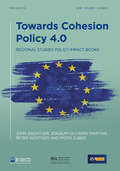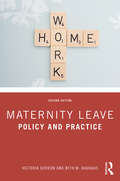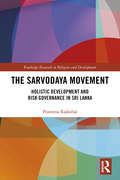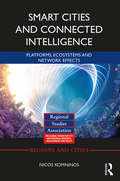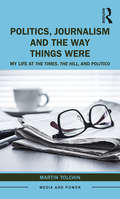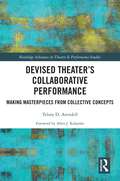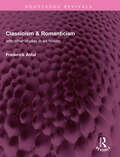- Table View
- List View
Willi Münzenberg: Fighter against Fascism and Stalinism (Routledge Studies in Radical History and Politics)
by John GreenWilli Münzenberg was a towering figure in the anti-fascist movement during the first half of the twentieth century. He was acquainted with many of the leading left wing activists and thinkers of his day including Lenin, Rosa Luxemburg, Karl Liebknecht, and Karl Radek. He also played a foundational role in several important transnational organisations such as the Socialist Youth International, the largest anti-war movement in opposition to the First World War, the International Workers’ Relief organisation, and the League against Colonialism and for National Independence. As a film distributor and promoter, he brought modern Soviet films to western Europe. As a publicist and manager, he built up the most influential left-wing media empire in the Weimar Republic and initiated the pioneering use of photography and photo montage. He was also a long-time member of the Reichstag. He was a pioneer in the use of a variety of media and the way he gained the support and collaboration of progressive politicians, artists and intellectuals ensured that he would become the leading, and most effective, opponent of Hitler’s and Goebbels’ propaganda machine, as he exposed the venality and brutality of the Nazis. Late in life, his turn against Stalinism almost certainly led to his mysterious death. This is the first detailed biography in English to give coverage to the full range of Münzenberg's activism. There are valuable lessons to be learnt from the book about the best ways to counter fascism which are powerfully relevant to our contemporary political situation. It should be of great interest to activists, scholars and those studying the history of the radical left.
Gandhi and the Contemporary World
by Sanjeev KumarThis book develops a critical understanding of Mahatma Gandhi’s philosophy and practice in the context of contemporary challenges and engages with some of his key work and ideas. It highlights the relevance of Gandhi’s legacy in the quest towards peace-building, equity and global justice. The volume examines diverse facets of Gandhi’s holistic view of human life – social, economic and political – for the creation of a just society. Bringing together expert analyses and reflections, the chapters here emphasise the philosophical and practical urgency of Gandhi's thought and action. They explore the significance of his concepts of truth and nonviolence to address moral, spiritual and ethical issues, growing intolerance, conflict and violence, poverty and hunger, and environmental crisis for the present world. The volume serves as a platform for constructive dialogue for academics, researchers, policymakers and students to re-imagine Gandhi and his moral and political principles. It will be of great interest to those in philosophy, political studies, Gandhi studies, history, cultural studies, peace studies and sociology.
Terrorist Rehabilitation and Community Engagement in Malaysia and Southeast Asia (Routledge Studies in the Politics of Disorder and Instability)
by Mohd Mizan Aslam Rohan GunaratnaThe contributors to this book analyse the different approaches and modes of terrorist rehabilitation that have been attempted by Malaysia, and other countries in Southeast Asia. With an emphasis on the particular contexts within which they operate, this book examines the factors that determine the relative successes and failure of a wide range of community initiatives in integrating terrorists back into society. These initiatives include using methods based on social psychology, religion, and entrepreneurship to develop a comprehensive approach to rehabilitating and deradicalizing terrorists in Malaysia as well as Singapore, Indonesia and the Philippines. As such it makes an important contribution to the global policy debate, coloured by the unique characteristics of the South East Asia region. A valuable resource for researchers and policymakers seeking constructive ways to counter violent extremism.
Towards a Climate-Neutral Europe: Curbing the Trend
by Jos Delbeke Peter VisThis book explains the EU’s climate policies in an accessible way, to demonstrate the step-by-step approach that has been used to develop these policies, and the ways in which they have been tested and further improved in the light of experience. The latest changes to the legislation are fully explained throughout. The chapters throughout this volume show that no single policy instrument can bring down greenhouse gas emissions. The challenge facing the EU, as for many countries that have made pledges under the Paris Agreement, is to put together a toolbox of policy instruments that is coherent, delivers emissions reductions, and is cost-effective. The book stands out by the fact it covers the EU’s emissions trading system, the energy sector and other economic sectors, including their development in the context of international climate policy. This accessible book will be of great relevance to students, scholars and policy makers alike.
Contemporary Capitalism, Crisis, and the Politics of Fiction: Literature Beyond Fordism (Routledge Studies in Contemporary Literature)
by Roberto del Valle AlcaláContemporary Capitalism, Crisis, and the Politics of Fiction: Literature Beyond Fordism proposes a fresh approach to contemporary fictional engagements with the idea of crisis in capitalism and its various social and economic manifestations. The book investigates how late-twentieth and twenty-first-century Anglophone fiction has imagined, interpreted, and in most cases resisted, the collapse of the socio-economic structures built after the Second World War and their replacement with a presumably immaterial order of finance-led economic development. Through a series of detailed readings of the words of authors Martin Amis, Hari Kunzru, Don DeLillo, Zia Haider Rahman, John Lanchester, Paul Murray and Zadie Smith among others, this study sheds light on the embattled and decidedly unstable nature of contemporary capitalism.
Gandhi: An Impossible Possibility
by Sudhir ChandraGandhi was perhaps the most influential yet misunderstood figure of the twentieth century. Drawing close attention to his last years, this book explores the marked change in his understanding of the acceptance of non-violence by Indians. It points to a startling discovery Gandhi made in the years preceding India’s Independence and Partition: the struggle for freedom which he had all along believed to be non-violent was in fact not so. He realised that there was a causal relationship between the path of illusory ahimsa, which had held sway during the freedom struggle, and the violence that erupted thereafter during Partition. In the second edition of this much-acclaimed volume, Chandra revisits Gandhi’s philosophy to explain how and why the phenomenon of the Mahatma has been understood and misunderstood through the years. Calling for a rethink of the very nature and foundation of modern India, this book throws new light on Gandhian philosophy and its far-reaching implications for the world today. It will interest not only scholars and researchers of modern Indian history, politics and philosophy, but also lay readers.
Legal Challenges to the Far-Right: Lessons from England and Wales (Routledge Studies in Fascism and the Far Right)
by Natalie AlkiviadouThe work considers the international and European obligations of the UK in the realm of challenging the far-right and assesses the extent to which it adheres to them. It looks at the role of criminal law in tackling hate speech and hate crime and assesses how English law deals with political parties which may deviate from agreed norms and principles such as non-discrimination. The legal analysis is placed within a contextual framework of far-right parties in the United Kingdom and also incorporates a definitional framework in terms of how the law defines themes relevant to challenging the far-right, such as racial discrimination, terrorism and extremism. The book presents a valuable guide for students, academics and policy-makers in the areas of International Human Rights Law, Criminal Law, Comparative Constitutional Law, National Security Law, Comparative Politics and Terrorism Studies.
Moving through Conflict: Dance and Politcs in Israel
by Dina Roginsky Henia RottenbergMoving through Conflict: Dance and Politics in Israel is a pioneering project in examining the Israeli–Palestinian conflict through dance. It proposes a research framework for study of the social, cultural, aesthetic and political dynamics between Jews and Arabs as reflected in dance from late 19th-century Palestine to present-day Israel. Drawing on multiple disciplines, this book examines a variety of social and theatrical venues (communities, dance groups, evening classes and staged performances), dance genres (folk dancing, social dancing and theatrical dancing) and different cultural identities (Israeli, Palestinian and American). Underlying this work is a fundamental question: can the body and dance operate as nonverbal autonomous agents to mediate change in conflicting settings, transforming the "foreign" into the "familiar"? Or are they bound to their culturally dependent significance – and thus nothing more than additional sites of an embodied politics? This anthology expounds on various studies on dance, historical periods, points of view and points of contact that help promote thinking about this fundamental issue. It will be of great interest to students and scholars of dance studies, sociology, anthropology, art history, education and cultural studies, as well as conflict and resolution studies.
Student Engagement, Higher Education, and Social Justice: Beyond Neoliberalism and the Market
by Corinna Bramley Keith MorrisonStudent engagement is a catch-all term, irresistible to educators and policy makers, and serving many agendas and purposes. This ground-breaking book provides a powerful theory of student engagement, rooted in critical theory and social justice. It sets out a compelling argument for student engagement to promote social justice and to repel neoliberalism in, and through, higher education, addressing three key questions: Student engagement in what? Student engagement for what? Student engagement for whom? The answers draw on Habermas, Honneth, Gramsci, Foucault, and Giroux in examining ideology, power, recognition, resistance, and student engagement, with examples drawn from across the world. It sets out key features, limitations, and failures of neoliberalism in higher education, and indicates how student engagement can resist it. Student engagement calls for higher education institutions to be sites for challenge, debate on values and power, action for social justice, and for students to engage in the struggle to resist neoliberalism, taking action to promote social justice, democracy, and the public good. This book is essential reading for educators, researchers, managers and students in higher education, social scientists, and social theorists. It is a call to reawaken higher education for social justice, human rights, democracy, and freedoms.
Islamic Identity and Development after the Ottomans: The Arab Middle East (Routledge Studies in Middle Eastern Politics)
by Özay MehmetExploring themes of identity and development in the post-Ottoman Arab world, this book updates the author’s earlier Islamic Identity and Development (Routledge, 1990) to analyse the root causes of chaos, civil war, and conflict in the Islamic Core today. Adopting a neo-Ottomanist framework, and using the latest scholarship on the Middle East, the author traces the historical development of the current crisis to the First World War, when the West instigated invasions, coup d’états, civil and proxy wars. It is argued that Western powers have facilitated the dispossession of the Arab people in their overarching aim to gain control of the oil fields. A range of historical case-studies are provided as evidence, from the Balfour Declaration and the Sykes-Picot Agreement to the creation of Israel and the displacement of Islamic refugees. Individual nations are also analysed, including Iran, Saudi Arabia, Iraq, Syria, Libya, and Egypt. Ultimately, the author suggests that artificial countries and unsustainable frontiers are the root causes of the Islamic crisis. However, a realistic (and long-term) solution may lie in the evolution of a new Silk Route Economy. This book will appeal to graduate-level students in political economy, area studies, international affairs, and Middle East studies generally.
Contested Territories and International Law: A Comparative Study of the Nagorno-Karabakh Conflict and the Aland Islands Precedent
by Kamal Makili-AliyevThis book considers the possibilities for resolution of the Nagorno-Karabakh Conflict in the context of comparative international law. The armed conflict between Armenia and Azerbaijan over the territory of the Nagorno-Karabakh has been on the peace and security agenda since the dissolution of the Soviet Union. This volume draws parallels with a similar situation between Sweden and Finland over sovereignty of the Aland Islands in the early 20th century. Resolved in 1921, it is argued that this represents a model autonomy solution for territorial conflicts that include questions of territorial integrity, self-determination and minority rights. The book compares both conflict situations from the international law perspective, finding both commonalities and dissimilarities. It advances the application of the solution found in the Aland Islands precedent as a model for the resolution of the Nagorno-Karabakh Conflict, and provides appropriate recommendations for its implementation. The book will be of interest to academics, researchers and policymakers in the areas of international law and security, conflict resolution and international relations.
Thomas Paine and America, 1776-1809 Vol 4: The Age Of Reason
by Kenneth W BurchellFrom his migration to America in 1774 to his death in New York City in 1809, Thomas Paine's ideology was at the centre of American political and social debate. This six-volume facsimile edition brings together rare texts from books, periodicals and newspaper contributions to unearth the contemporary American response to Thomas Paine.
Thomas Paine and America, 1776-1809 Vol 3: The Age Of Reason
by Kenneth W BurchellFrom his migration to America in 1774 to his death in New York City in 1809, Thomas Paine's ideology was at the centre of American political and social debate. This six-volume facsimile edition brings together rare texts from books, periodicals and newspaper contributions to unearth the contemporary American response to Thomas Paine.
The Political and Philosophical Writings of William Godwin vol 2
by Mark Philp Pamela Clemit Martin Fitzpatrick William St.ClairContains all the major political, philosophical and educational writings of William Godwin, one of the foremost philosophers of his age. His work on government and individual freedom, "Political Justice", made him the chief exponent of English radicalism in the latter half of the 18th century.
The Political and Philosophical Writings of William Godwin vol 1
by Mark Philp Pamela Clemit Martin Fitzpatrick William St.ClairContains all the major political, philosophical and educational writings of William Godwin, one of the foremost philosophers of his age. His work on government and individual freedom, "Political Justice", made him the chief exponent of English radicalism in the latter half of the 18th century.
Eighteenth-Century English Labouring-Class Poets, vol 1
by John Goodridge Simon Kövesi David Fairer Tim Burke William ChristmasPoets of labouring class origin were published in Britain in the 18th and 19th centuries. Some were popular and important in their day but few are available today. This is a collection of some of those poems from the 18th century.
On Public Imagination: A Political and Ethical Imperative
by Michael Curtin Richard Falk Victor FaesselIn this wide-ranging and multidisciplinary volume, leading scholars, activists, journalists, and public figures deliberate about the creative and critical potential of public imagination in an era paradoxically marked by intensifying globalization and resurgent nationalism. Divided into five sections, these chapters explore the social, political, and cultural role of imagination and civic engagement, offering cogent, ingenious reflections that stand in stark contrast to the often grim rhetoric of our era. Short and succinct, the chapters engage with an interconnected ensemble of themes and issues while also providing insights into the specific geographical and social dynamics of each author’s national or regional context. • Part 1 introduces the reader to theoretical reflections on imagination and the public sphere; • Part 2 illustrates dynamics of public imagination in a diverse set of cultural contexts; • Part 3 reflects in various ways on the urgent need for a radically transformed public and civic imagination in the face of worldwide ecological crisis; • Part 4 suggests new societal possibilities that are related to spiritual as well as politically revolutionary sources of inspiration; • Part 5 explores characteristics of present and potentially emerging global society and the existing transnational framework that could provide resources for a more humane global order. Erudite and thought-provoking, On Public Imagination makes a vital contribution to political thought, and is accessible to activists, students, and scholars alike.
Big Data, Political Campaigning and the Law: Democracy and Privacy in the Age of Micro-Targeting
by Janice Richardson Moira Paterson Normann WitzlebIn this multidisciplinary book, experts from around the globe examine how data-driven political campaigning works, what challenges it poses for personal privacy and democracy, and how emerging practices should be regulated. The rise of big data analytics in the political process has triggered official investigations in many countries around the world, and become the subject of broad and intense debate. Political parties increasingly rely on data analytics to profile the electorate and to target specific voter groups with individualised messages based on their demographic attributes. Political micro-targeting has become a major factor in modern campaigning, because of its potential to influence opinions, to mobilise supporters and to get out votes. The book explores the legal, philosophical and political dimensions of big data analytics in the electoral process. It demonstrates that the unregulated use of big personal data for political purposes not only infringes voters’ privacy rights, but also has the potential to jeopardise the future of the democratic process, and proposes reforms to address the key regulatory and ethical questions arising from the mining, use and storage of massive amounts of voter data. Providing an interdisciplinary assessment of the use and regulation of big data in the political process, this book will appeal to scholars from law, political science, political philosophy and media studies, policy makers and anyone who cares about democracy in the age of data-driven political campaigning.
Towards Cohesion Policy 4.0: Structural Transformation and Inclusive Growth (Regional Studies Policy Impact Books)
by John Bachtler Joaquim Oliveira Martins Peter Wostner Piotr ZuberIn the context of the debate on the future of Europe, this book makes the case for a new approach to structural transformation, growth and cohesion in the EU. It explores both the opportunities and challenges from globalisation and technological change, the widening differences in productivity between leading and lagging regions, and the need for a new policy framework capable of delivering inclusive growth. The Regional Studies Association’s Policy Impact Books form a series of punchy, policy facing books addressing issues of contemporary concern. There is a consistent focus on the impact of policy research both in terms of its reach to policy, academic and practitioner communities and also in its significance, to show how evidence can inform policy change within regional and urban studies.
Maternity Leave: Policy and Practice
by Victoria Gordon Beth M. RauhausWhat does it mean to be a successful working parent? And how do working parents cope in the United States, the only developed nation with no paid parental leave requirement? Despite some positive advancement in the voluntary adoption of paid parental leave, many organizations over the past 25 years have instead decreased paid leave benefits offered to employees in the United States, choosing instead to let unpaid leave under the Family Medical Leave Act (FMLA) serve in its place. This regression in practice is perhaps the greatest unintended consequence of FMLA and surely was not the intent of Congress. Maternity Leave: Policy and Practice, Second Edition approaches parental leave from a variety of perspectives: legal, political, social, institutional, organizational, and, most importantly, from the personal perspectives of the women and men interviewed expressly for the book. This second edition offers two new chapters: the first puts the issue of maternity leave within the context of work–life balance issues, and the second explores case studies from states, cities, and private organizations. Incorporating new census data, related reports, and academic studies, authors Victoria Gordon and Beth M. Rauhaus utilize relevant and cutting-edge research in their exploration of parental leave, and they enrich this research with the individual stories of ordinary working parents as well as those who choose not to have children. Assuming no prior specialized knowledge, this book can be assigned on a variety of undergraduate and graduate courses in politics, public policy, public administration, gender studies, and human resource management, and will equally be of interest to parents, policy makers, and C-suite managers.
The Sarvodaya Movement: Holistic Development and Risk Governance in Sri Lanka (Routledge Research in Religion and Development)
by Praveena RajkobalThis book provides an important case study of how local cultures, religions and spiritualities can enhance development activities, and provide helpful frameworks for contemporary societies facing the pressures of neo-liberalism. It specifically traces how the influential Sri Lankan Sarvodaya Movement has deployed concepts of spirituality-based holistic development to help local communities with post-tsunami reconstruction and redevelopment. Throughout, the author provides a Three-Sphere conceptualisation of holistic sustainable development, focused on Culture, Economics and Power, slightly revising Sarvodaya’s Three-Sphere model comprising Spirituality, Economics and Power. The author contends that the success of holistic development, including risk governance, is largely contingent on an awareness of the interdependency of these three spheres, and establishing equitable partnerships between communities, NGOs, INGOs, States and the private sector. Overall, this book argues that religion, spirituality and non-religious worldviews play an important role among other resources concerned with how to survive the pressures of neo-liberalism and environmental risks and crises. The Sarvodaya Movement, which draws on Buddhist concepts of spirituality, is widely acknowledged as an important example of spirituality and community-driven development, and as such, this book will be of interest to scholars of Development and Humanitarian Studies, Religious Studies and South Asian Studies.
Smart Cities and Connected Intelligence: Platforms, Ecosystems and Network Effects (Regions and Cities)
by Nicos KomninosInternet and World Wide Web platforms, big data analytics, software, social media and civic technologies allow for the creation of smart ecosystems in which connected intelligence emerges and disruptive social and eco-innovation flourishes. This book focuses on three grand challenges that matter for any territory, no matter where it is located: (i) smart growth, a path that more and more cities, regions and countries are adopting having realised the unlimited potential of growth that is based on knowledge, innovation and digital technologies; (ii) safety and security, which is a pre-requisite for quality of life in a world of intense social, natural and technological threats; and (iii) sustainability, use of renewable energy, protection of living ecosystems, addressing climate change and global warming in a period of rapid urbanisation that makes established sustainability models and planning patterns quickly obsolete. The core argument of the book is that problem-solving and novel solutions to these grand challenges emerge in smart ecosystems through connected intelligence. It is the broadest form of intelligence that combines capabilities from heterogeneous actors (humans, organisations, machines) and propel problem-solving through externalities and resource agglomeration, user engagement and collaboration, awareness and behaviour change. This book will be of interest to students and researchers of urban and regional studies, innovation studies, economic geography and urban planning, as well as urban policy makers.
Politics, Journalism, and The Way Things Were: My Life at The Times, The Hill, and Politico (Media and Power)
by Martin TolchinIn this book, Martin Tolchin describes his journey from New York Times copy boy to White House correspondent, and as founder of The Hill and co-founder of Politico. He tells of the talented and eccentric colleagues he encountered en route, and the conflicts and tensions that beset him during his 40-year news career. Along the way, he tracks the evolution of political journalism from mostly all-male, smoke-filled newsrooms to the high-tech world of the 24/7 news cycle. As a local reporter in New York City, Tolchin saw his articles change public policy and re-direct millions of dollars in public funds. Nationally, Tolchin reported on some of the country’s most important political leaders, including Ronald Reagan, Jimmy Carter, and Tip O’Neill, among many others. As a Washington correspondent he was involved in Iran Contra, the Anita Hill hearings on the nomination of Justice Clarence Thomas, and Washington’s response to the New York City financial crisis. Mr. Tolchin writes with extraordinary candor and optimism. His story is one that will inform and inspire students, scholars, and general readers in an era in which fake news has sometimes overtaken legitimate reporting. He believes in the power of a free press to guard and guide free people.
Devised Theater’s Collaborative Performance: Making Masterpieces from Collective Concepts (Routledge Advances in Theatre & Performance Studies)
by Telory D ArendellThis book provides a fascinating and concise history of devised theatre practice. As both a founding member of Philadelphia’s Pig Iron Theater Company and a Professor, Telory Arendell begins this journey with a brief history of Joan Littlewood’s Theatre Workshop and Living Newspapers through Brecht’s Berliner Ensemble and Joe Chaikin’s Open Theatre to the racially inflected commentary of Luis Valdez’s Teatro Campesino and Ariane Mnouchkine’s collaboration with Théâtre de Soleil. This book explores the impact of devised theatre on social practice and analyzes Goat Island’s use of Pina Bausch’s gestural movement, Augusto Boal’s Theatre of the Oppressed in Giving Voice, Anna Deavere Smith’s devised envelope for Verbatim Theatre, The Tectonic Theatre Project’s moment work, Teya Sepinuck’s Theatre of Witness, Pig Iron’s use of Lecoq mime to build complex physical theatre scripts, and The Riot Group’s musical arrangement of collaborative devised text. Included are a foreword by Allen J. Kuharski and three devised plays by Theatre of Witness, Pig Iron, and The Riot Group. Replete with interviews from the initial Pig Iron collaborators on subjects of writing, directing, choreographing, teaching, and developing a pedagogical platform that supports devised theatre.
Classicism & Romanticism: with other studies in art history (Routledge Revivals)
by Frederick AntalFirst published in 1966, Classicism and Romanticism is a collection of important articles originally published in the author's famous book, Florentine Painting and its Social Background. Dr. Antal, a Hungarian by birth, was a man of the wildest culture. He studied art history in the universities of Budapest, Berlin, Paris and Vienna; thereafter, he travelled extensively in Italy, where he devoted himself to pioneering research in the history of mannerist painting. His exceptional sensitivity to the visual arts is apparent in such brilliant stylistic analyses as the essays on Netherlandish mannerism and on Girolamo da Carpi. He is known especially, however, for his application to art history of the sociological method. By returning art to its place in the general history of ideas and relating it to its economic, social, and political environment, he sought to give to the history of art a wider significance ad deeper meaning. This book will be of interest to students of art, history, literature, art history and European studies.
